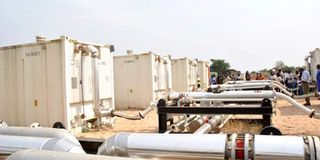Prime
Oil refinery: Residents reject government pay

A section of Kigogole oil well in Hoima District. A total of 29 square kilometres in Kabale Parish in Hoima was mapped to accommodate the refinery complex, staff quarters, health facilities, and an airfield. PHOTO By Isaac Imaka.
What you need to know:
Residents of Kabale Parish in Hoima District, on whose land the government wants to construct an oil refinery, say the government is undervaluing their property.
HOIMA/KAMPALA
More than 7,000 people displaced by the construction of the oil refinery in Kabale Parish in Buseruka Sub-county, Hoima District have rejected the government’s valuation price for their land. They say the government undervalued their land and the properties thereon and vowed not to leave unless they are paid the appropriate price for their property.
Kabale Parish in the Albertine oil belt, comprises 13 villages. The government commissioned a Swiss firm, Foster Wheeler, to carry out a study to establish a suitable place for constructing the refinery, which is expected to cost at least $2b (Shs5.2 trillion). The firm recommended Kabale Parish as the most ideal site.
The government started the process of resettling and compensating the affected residents by paying them cash or relocating them to an alternative land.
One of the affected residents, Mr David Besigye, 80, from Kyaplalonyi Village, said the government undervalued their properties. “They are forcing us to give them the land and they can’t even allow us to bargain on how much we want to be paid,” Mr Besigye said. The residents accuse the government of hatching a plan to underpay them. Residents in various villages said suspected security and State agents had been threatening land owners to take what the government has offered them and leave the area.
Several residents said the government did not consult them to discuss the valuation of their property. They said the government consulted the district administration to decide the amount for each resident instead of discussing with the land owners.
Government then hired a consultancy firm, Strategic Friends International (SFI) to conduct the Resettlement Action Plan (RAP) to guide the compensation process based on the prevailing market rate. In its report, SFI said 7,118 people and 221 households would be affected by the refinery project.
Refinery Project Communications Officer Bashir Hangi, said: “All valuations for property were set at the district headquarters, but were approved by a chief government valuer. All preliminary outcomes from the components of the RAP study were shared with the affected persons.”
The SFI has been re-contracted by the government to implement its recommendations. This has sparked off suspicion of foul play. “If SFI erred in conducting the initial survey, it’s likely to err adversely during the implementation stage,” said MP Theodore Ssekikubo, chairman of the parliamentary Forum on Oil and Gas recently.
The affected communities have branded the exercise a “rip-off”. While a plot of land around Hoima Town is valued at between Shs3m to Shs5m, residents have been either paid the same, less or more depending on the developments on the said land. All valuations were approved by the district chief valuer. “What is even worse is that the rates are based on the 2011/2012 financial year yet we are a year ahead,” said Mr Ezekiel Kabanda, a resident.
Some of the displayed compensation rates, value an acre of banana plantation at between Shs350,000 and Shs1.4m; an acre of maize between Shs330,000 and Shs1.2m and a coffee garden between Shs300,000 and Shs2m. “If they don’t give our people enough compensation money we will mobilise them against the project,” Mr Banarbas Tinkasiimire, (MP for Buyaga County in Bunyoro) warned during a recent meeting with the affected people.
The government has earmarked Shs78b for the exercise.
Civil rights groups are pushing for higher compensation payments than what the government is offering. But the government is adamant the rates are sufficient based on the principle of “equity and equivalence” which means that the affected owners are neither enriched nor impoverished by the process.
Last week, Internal Affairs minister Aronda Nyakayirima accused the civil society organisations of sabotaging oil activities and vowed to crack the whip on whoever does not have a licence to operate in the oil area. Mr Emmanuel Odim, a resident of Nyahaira Village, claimed that the government is determining compensation payments on house-by-house basis which means that a valuation of property in one household may be different from the price offered for similar property in the neighbour’s home.
Of the 1,221 affected households, only 27 have accepted to be resettled. The rest want cash. Mr Dickens Kamugisha, the executive director of African Institute for Energy Governance, said: “While SFI is busy telling the affected persons to sign for compensation in monetary terms, there is no information for those who want to be resettled by the government in places of their choice.” He said people who wanted resettlement instead of cash payment were being indirectly forced to sign for money as they see no hope of getting resettled.
SFI could not be reached for comment, but Mr Hangi said all complaints were being handled by a committee representing all interested groups. He said the complainants’ claims had no merit.
Mr Lyandro Komakech, a research officer at the Refugee Law Project (RLP), said compensations were rushed before establishing laws to streamline the exercise. “We don’t have laws to guarantee the safety of internally displaced persons and most likely it’s what these people are headed for because they are locked out of the policies they are party to,” he said.
The RLP noted in its research findings released in May that senior government officials had superficially acquired property by hoodwinking and buying land cheaply from the illiterate poor residents at the proposed site for the refinery and they were the most likely to benefit from the compensation.



